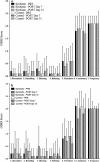Daily consumption of a synbiotic yogurt decreases energy intake but does not improve gastrointestinal transit time: a double-blind, randomized, crossover study in healthy adults
- PMID: 23787118
- PMCID: PMC3703448
- DOI: 10.1186/1475-2891-12-87
Daily consumption of a synbiotic yogurt decreases energy intake but does not improve gastrointestinal transit time: a double-blind, randomized, crossover study in healthy adults
Abstract
Objective: Probiotic and synbiotic products are widely marketed to healthy individuals, although potential benefits for these individuals are rarely studied. This study investigated the effect of daily consumption of a synbiotic yogurt on gastrointestinal (GI) function in a sample of healthy adults.
Subjects/methods: In a randomized crossover double-blind study, 65 healthy adults consumed 200 g/day of yogurt with (synbiotic) or without (control) added probiotics (Bifidobacterium lactis Bb12, Lactobacillus acidophilus La5, Lactobacillus casei CRL431) and 4 g inulin for two 15-day treatment periods, each preceded by a 6-week washout period. GI transit time (GTT), duration of colour (DOC), GI symptoms and dietary intake were assessed and analyzed using repeated measures ANOVA, including PRE-treatment GTT as a covariate. Participants were grouped as short GTT (STT, n = 50, ≤32.7 h) or long GTT (LTT, n = 15, >32.7 h) based on their PRE-treatment GTT assessment.
Results: POST-treatment GTT and DOC were not different between synbiotic and control, and did not change from PRE-treatment, within the STT or LTT groups. There were no changes in GI symptom ratings, indicating that both yogurts were well tolerated. In STT, energy, fat and protein intakes were decreased from baseline with synbiotic (p = 0.055, p = 0.059 and p = 0.005, respectively) and dietary fibre intake was higher POST-treatment with synbiotic versus control (p = 0.0002). In LTT, decreases in energy and fat intakes with synbiotic were not significant (p = 0.14 and p = 0.18, respectively) and there were no differences in dietary fibre intake.
Conclusion: Consuming 200 g/day of synbiotic yogurt did not significantly alter GTT in healthy adults, but was well tolerated and helped to reduce overall energy intake.
Figures


Similar articles
-
Therapeutic and Nutritional Effects of Synbiotic Yogurts in Children and Adults: a Clinical Review.Probiotics Antimicrob Proteins. 2020 Sep;12(3):851-859. doi: 10.1007/s12602-019-09594-x. Probiotics Antimicrob Proteins. 2020. PMID: 31823334 Review.
-
Synbiotic Intervention with Lactobacilli, Bifidobacteria, and Inulin in Healthy Volunteers Increases the Abundance of Bifidobacteria but Does Not Alter Microbial Diversity.Appl Environ Microbiol. 2022 Oct 11;88(19):e0108722. doi: 10.1128/aem.01087-22. Epub 2022 Sep 27. Appl Environ Microbiol. 2022. PMID: 36165644 Free PMC article.
-
Randomised, double-blind and placebo-controlled study of the effect of a synbiotic dairy product on orocecal transit time in healthy adult women.Nutr Hosp. 2012 Jul-Aug;27(4):1314-9. doi: 10.3305/nh.2012.27.4.5770. Nutr Hosp. 2012. PMID: 23165580 Clinical Trial.
-
Matrix Effects on the Delivery Efficacy of Bifidobacterium animalis subsp. lactis BB-12 on Fecal Microbiota, Gut Transit Time, and Short-Chain Fatty Acids in Healthy Young Adults.mSphere. 2021 Aug 25;6(4):e0008421. doi: 10.1128/mSphere.00084-21. Epub 2021 Jul 7. mSphere. 2021. PMID: 34232082 Free PMC article. Clinical Trial.
-
Bacteriotherapy and probiotics' role on oral health.Oral Dis. 2005 May;11(3):131-7. doi: 10.1111/j.1601-0825.2005.01109.x. Oral Dis. 2005. PMID: 15888102 Review.
Cited by
-
Therapeutic and Nutritional Effects of Synbiotic Yogurts in Children and Adults: a Clinical Review.Probiotics Antimicrob Proteins. 2020 Sep;12(3):851-859. doi: 10.1007/s12602-019-09594-x. Probiotics Antimicrob Proteins. 2020. PMID: 31823334 Review.
-
Unveiling probiotic and prebiotic functional dairy foods: a health beneficial outlook.3 Biotech. 2025 Jun;15(6):175. doi: 10.1007/s13205-025-04341-2. Epub 2025 May 17. 3 Biotech. 2025. PMID: 40386633 Review.
-
Contemporary meta-analysis of short-term probiotic consumption on gastrointestinal transit.World J Gastroenterol. 2016 Jun 7;22(21):5122-31. doi: 10.3748/wjg.v22.i21.5122. World J Gastroenterol. 2016. PMID: 27275105 Free PMC article.
-
Sensory Acceptance, Appetite Control and Gastrointestinal Tolerance of Yogurts Containing Coffee-Cascara Extract and Inulin.Nutrients. 2020 Feb 27;12(3):627. doi: 10.3390/nu12030627. Nutrients. 2020. PMID: 32121016 Free PMC article. Clinical Trial.
-
Microbiota and enteric nervous system crosstalk in diabetic gastroenteropathy: bridging mechanistic insights to microbiome-based therapies.Front Cell Infect Microbiol. 2025 Aug 11;15:1603442. doi: 10.3389/fcimb.2025.1603442. eCollection 2025. Front Cell Infect Microbiol. 2025. PMID: 40861487 Free PMC article. Review.
References
-
- Heller KJ. Probiotic bacteria in fermented foods: product characteristics and starter organisms. Am J Clin Nutr. 2001;73:374S–379S. - PubMed
Publication types
MeSH terms
Substances
LinkOut - more resources
Full Text Sources
Other Literature Sources

